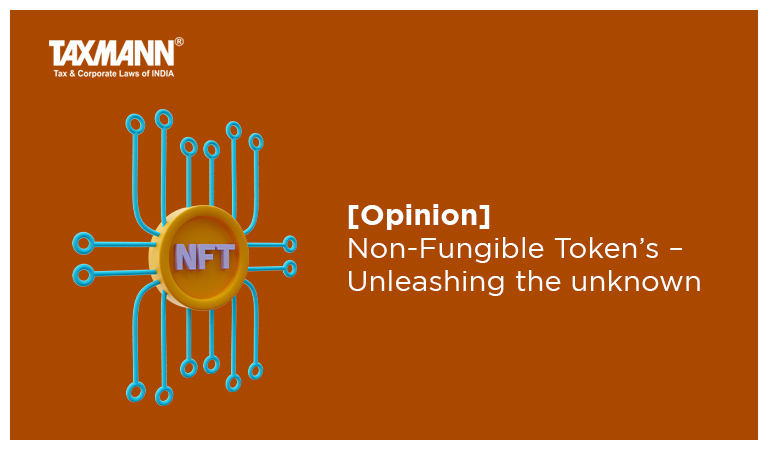[Opinion] Non-Fungible Token’s – Unleashing the unknown
- Blog|News|Income Tax|
- 3 Min Read
- By Taxmann
- |
- Last Updated on 9 August, 2022

Biren Vyas, Kruti Shukla & Karishma Punjabi – [2022] 141 taxmann.com 173 (Article)
Understanding NFTs
Value of NFTs
Recent trends in the NFT market evidences that digital ownership of an artwork, image, etc., comes with a whopping high monetary value attached to it. Yet, many still wonder how tokens on the internet could have a monetary value at all – especially when majority of them just represent digital ownership of an online image or an animation that one could, in principle, download a copy of for free.
NFTs in the Indian context
In the Indian context, various artists, platform owners and auctioneers are hopeful that NFTs would be the next horizon of Indian art, especially in the wake of COVID-19. In India, the party has just begun, where celebrities are launching their exclusive NFTs. The primary reason why NFTs are gaining impetus amongst the Indian creators is the elimination of the middleman when it comes to monetization. Creators are required to pay a listing fee, termed as ‘gas fee’ to the NFT trading platforms.
Another reason why NFTs are gaining the buzz in the Indian market, is the royalty paid to the owner on each secondary sale of NFT. This gives a lot of impetus to budding artists to showcase their talent and earn revenue on primary sale of their artwork, at the same time, giving them an opportunity to earn passive income in the name of royalty on each subsequent secondary sale of their artwork.
Click Here To Read The Full Article
Disclaimer: The content/information published on the website is only for general information of the user and shall not be construed as legal advice. While the Taxmann has exercised reasonable efforts to ensure the veracity of information/content published, Taxmann shall be under no liability in any manner whatsoever for incorrect information, if any.

Taxmann Publications has a dedicated in-house Research & Editorial Team. This team consists of a team of Chartered Accountants, Company Secretaries, and Lawyers. This team works under the guidance and supervision of editor-in-chief Mr Rakesh Bhargava.
The Research and Editorial Team is responsible for developing reliable and accurate content for the readers. The team follows the six-sigma approach to achieve the benchmark of zero error in its publications and research platforms. The team ensures that the following publication guidelines are thoroughly followed while developing the content:
- The statutory material is obtained only from the authorized and reliable sources
- All the latest developments in the judicial and legislative fields are covered
- Prepare the analytical write-ups on current, controversial, and important issues to help the readers to understand the concept and its implications
- Every content published by Taxmann is complete, accurate and lucid
- All evidence-based statements are supported with proper reference to Section, Circular No., Notification No. or citations
- The golden rules of grammar, style and consistency are thoroughly followed
- Font and size that’s easy to read and remain consistent across all imprint and digital publications are applied



 CA | CS | CMA
CA | CS | CMA
